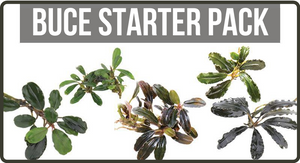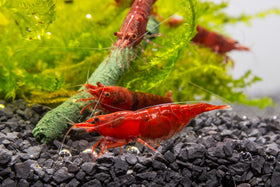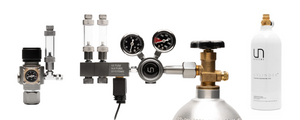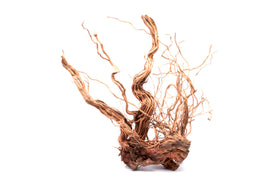Get Started Essentials
EVERYTHING YOU WILL NEED:
1. Tank

The first thing you’ll need is an actual aquarium, the container that will hold everything inside. Tanks like the UNS rimless aquariums provide high-end glass walls that will allow you to see clearly into the tank. They also come in many different dimensions that will surely fit your needs!
2. Filter

The purpose of the filter is not only to keep the water visibly clean, but also chemically clean. Water should constantly be flowing in and out of the filter, running through the media inside of it. Filters come in a variety of forms, popular ones being hang-on-back filters, sponge filters, and canister filters. Each type of filter has its own advantages and disadvantages.
- To learn more about each one, check out “Beginner’s Guide to Aquarium Filters and Types of Filtration”.
3. LED Lighting

One of the requirements needed for plants to grow is a quality LED light. Without light, they would not be able to photosynthesize. A good light will also make the colors within the tank pop out more. A general rule to follow is to keep the light on for 8 hours a day starting at the same time each day. Consistency is important for plants as they also keep to a schedule like we do.
- To learn more about lighting, feel free to read “Lighting Requirements for a Planted Aquarium”
- Check out our favorite LED lighting brand, Twinstar, and the article "Which Twinstar is Best For You"
4. Substrate

The recommended substrate for planted tanks is aquarium soil like UNS Controsoil because it provides necessary nutrients for plants to grow and thrive. It’s especially important for plants that feed predominantly through their roots. An added benefit of aquarium soil is that it tends to lower the pH and soften the water, which can make the water parameters more ideal for some fish and shrimp species.
There’s also more cosmetic substrates like sand and gravel. While these types of substrates don’t really provide any benefits to plants (unless a fertilizer like root tabs are added), they are aesthetically more pleasing to look at than dirt. A combination of soil and sand/gravel could be used to get the best of both worlds!
- Check out “Planted Aquarium Substrate: Soil, Gravel, and Sand” to learn more on this topic
5. Hardscape

The hardscape of the aquarium is a term that aquascapers use to define the objects they will use for the layout of their aquascape, which is primarily driftwood and rocks/stones. While optional to some, the hardscape gives an aquarium the opportunity to become a well-structured work of art.
6. Plants

Nowadays, aquatic plants come in many different species, which each require different planting/care. Since we are focused on getting started on your first tank, the plants that are listed will be considered “easy” to care for. This means that they should not require high light or CO2 to do well in an aquarium. Recommended plants to try are: moss, anubias, bucephalandra, ferns, and echinodorus. Tissue culture is a great option as well if you'd like to guarantee a clean start and avoid having to quarantine/bleach dip your plants. Tissue culture plants are always 100% algae free, pest free, and pesticide free.
If you opt out of tissue culture plants, don't forget to bleach dip your plants before adding them to your aquarium!
- Learn more about why in our article "How to Bleach Dip Aquarium Plants"
Now, Cycle Your Tank!
Once you have everything set up and running, there are some things you should know before adding any live fish or shrimp to the aquarium. Planted aquariums thrive when the golden triangle of parameters are in perfect balance. Lighting, CO2, and nutrients in the water column are the 3 main concepts you must have a good grasp on to have a successful planted aquarium.
Every time a new tank is set up, it has to be cycled before adding any aquatic creatures to ensure that it will be a safe environment for them. In short, beneficial bacteria has to be established in fish tank to convert toxins like ammonia into nitrates, a more tolerable form for fish and shrimp.
- Click here to learn "How to Cycle a Planted Aquarium"

Also, Keep Up with Water Changes!
While fish and shrimp can tolerate higher amounts of nitrates than ammonia, an excessive amount can still kill them. Also, an imbalance of any kind in the aquarium can cause unwanted algae. These are just a couple reasons as to why it's important to perform regular water changes in which you replace old tank water with new water.
- Click here to learn "How to Do Water Changes (& Why It's Important!)"
Another way to remove an abundance of nitrates is with using lots of PLANTS! Plants will take up nitrates as a food source, so the more plants you have growing, the better. It is even possible to create a self-sustaining aquarium with the help of plants!
TIPS TO REMEMBER:
1. Keep it simple
If this is your first go at a planted aquarium, don't go for the most difficult species of plants or the wildest hardscape layouts. Iwagumi style setups are great for beginners because it teaches you the basics of keeping an aquascape and how lighting and water parameters work. At the same time, they are beautiful in their simplicity. You can get away with just one or two different plant species.
- For tips on how to setup & maintain your first low-tech tank click HERE
2. Patience is key
We know it's hard to keep your hands out of your aquarium when you first set it up. Just remember that beneficial bacteria needs time to establish itself in your aquarium. Plants need time to adjust. If this is your first tank setup, give it a couple weeks or so before you go in and start tearing the place apart. A large part of keeping a successful aquarium is really keeping good quality water for your plants. Make sure water parameters out of your tap are good and you use a water conditioner before adding any water to your tank.
Most people in North America have very high pH. If you find that you're having a tough time keeping plants, instead try using filtered drinking water. Also, DO NOT use tap water if your home runs a salt-based water softener!
3. Dispose of your aquarium plants and livestock wisely
Introducing plants or livestock that are not indigenous to your area can have devastating effects. Even the smallest plant or creature can create a butterfly effect that may have long-lasting repercussions. It's our duty as nature enthusiasts to ensure that our environment is taken care of for generations to come. Please, please, please dispose of your aquarium plants and livestock in a responsible manner.
- Hot tip: Instead of throwing your plants into the garbage or flushing it down the toilet, take those propagations & start another aquascape! 😉
Feel free to reach out to Team Buce Plant if you have any questions at all! Also, check out Buce Blog for tons of aquascaping tips and information on a wide range of topics. Now, check out these top items for beginners to get started on a beautiful planted aquarium:
-
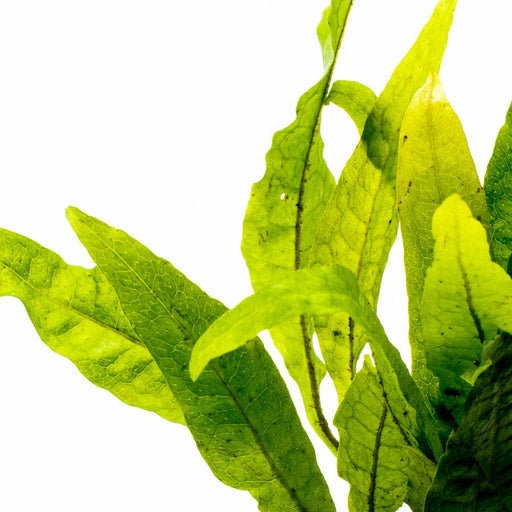
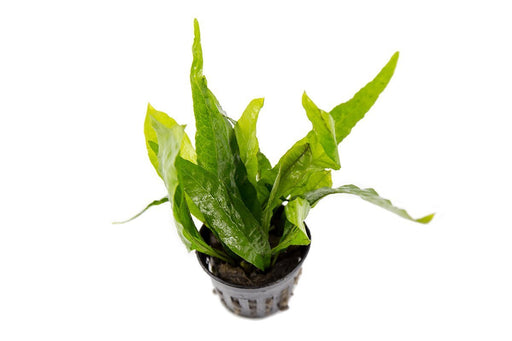 Save up to 8%
Save %
Original price $ 5.99 - Original price $ 23.99Original price $ 5.99 - Original price $ 23.99Original price $ 5.99$ 4.99 - $ 21.99$ 4.99 - $ 21.99Current price $ 4.99
Save up to 8%
Save %
Original price $ 5.99 - Original price $ 23.99Original price $ 5.99 - Original price $ 23.99Original price $ 5.99$ 4.99 - $ 21.99$ 4.99 - $ 21.99Current price $ 4.99Java Fern
Common Name: Java Fern, Microsorum Pteropus Java fern is one of the most popular aquarium plants in the hobby due to its beauty and easy care. They...
View full detailsOriginal price $ 5.99 - Original price $ 23.99Original price $ 5.99 - Original price $ 23.99Original price $ 5.99$ 4.99 - $ 21.99$ 4.99 - $ 21.99Current price $ 4.99Save up to 8% Save %

